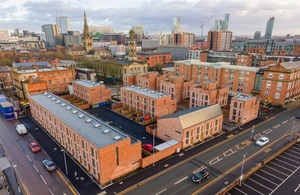The partnership behind some of the UK’s successful regen projects
With initial investment of £100 million, The English Cities Fund (ECF) is a national public private partnership of Homes England, Muse and Legal and General.

With a mission to take on challenging development sites and encourage private and institutional investment in cities, The English Cities Fund (ECF) is behind some of the UK’s most successful, place-changing regeneration projects.
The English Cities Fund (ECF) is a national public private partnership of Homes England, Muse and Legal and General. With initial investment of £100 million, and an additional £100 million of investment in 2018, ECF is on track to deliver six schemes in England comprising 1 million sq ft of office, retail and leisure space as well as 1,700 homes with a total value of £2.5 billion.
This innovative partnership has worked closely with local partners to spearhead impactful regeneration projects in Salford, Plymouth, Liverpool, Wakefield, Canning Town and is at the start of an exciting new partnership with St Helens Borough Council.
ECF was set up in 2001 to bring together the best of the public and private sector, combining the expertise and ambition of Homes England, the Government’s dedicated land and homes agency; Legal & General’s deep capabilities in delivering long-term, joined-up investment across UK property and infrastructure; and the nationwide urban regeneration expertise of Muse Developments.
ECF works in partnership with councils, landowners, and key community stakeholders to transform forgotten places to thriving, mixed-use communities.
Through an initial £100m investment from ECF partners, the team has brought forward five multi-phase regeneration schemes with a total value of £1.6 billion. In 2018 the partnership doubled its investment to £200 million, to provide certainty to new partners that complex, large scale, long-term developments could be realised, unlocking the potential of even more places.
One of those places is Salford, a city with a rich history of industry and culture. The city conjures up images of rows of terraced streets, alive with the buzz of everyday life.
Success in Salford
As the Government was setting up its Urban Task Force at the end of the 90s, Salford was suffering from two decades of decline - a victim of de-industrialisation and the inevitable migration of people to places of greater prosperity – increased crime and deprivation led to a perception problem.
ECF’s partnership with Salford City Council is transforming this historic city. Together, ECF and the council have assembled a 50-acre, isolated brownfield site across the River Irwell from Manchester city centre that was formally a surface car park and turned it into a dynamic destination in its own right, loved by the people who live and work there.
The 21-phase, £1 billion project is delivering a new commercial and leisure district at New Bailey, adjacent to Salford Central station and close to Manchester’s Spinningfields, keeping the place buzzing day and night. 1,484 high-quality homes have also been built as part of an inspiring new community in the Chapel Street district. The scheme has become an engine of growth and renewal for Salford. Among the first commercial organisations to call New Bailey home are Magic Circle law firm Freshfields Bruckhaus Deringer, BLM, Eversheds, HM Revenue and Customs and wealth management business WHIreland.
The development has delivered one of the North West’s first institutionally funded build-to-rent schemes – the Slate Yard, comprising 424 homes. Chapel Street, once an area of vacant shops and low investment, is now a vibrant urban village with six bespoke phases of 463 homes knitted seamlessly into the existing, historical, listed environment.
Backed by a bold vision of what the city could offer, some clever design ideas and a strong, long-term partnership, central Salford is once again an enterprising place which is attracting other investors. Even the car parks are award winning.
Making an impact in the South
In the South East, ECF built on its striking £200 million Rathbone Market scheme - which delivered 651 homes, of which 25% are affordable, and is now bringing forward a major new development in the borough at Manor Road in partnership with London Borough of Newham and the Greater London Authority.
On the South West coast, ECF is halfway through its £250 million regeneration of the Millbay area of Britain’s ocean city. With over £120 million invested in the area already, the new coastal quarter for Plymouth is delivering an innovative mix of residential, business and leisure development.
What next?
Looking to the future, ECF exchanged a 20-year development agreement in December 2020 with St Helens Borough Council. The partnership is borough wide and will aim to bring forward opportunities to repurpose and regenerate areas across St Helens, creating new grade A office space, delivery of town centre homes and improved public realm. Following a major consultation exercise, St Helens Council’s cabinet approved the masterplans in February 2021 to repurpose and regenerate the town centres of St Helens and Earlestown.
To date, ECF has generated 20,000 jobs, build 4,500 sustainable homes, provide over 145,000 of community facilities and generate £400m in GVA per annum to build strong communities. It has shown that it’s possible to commit for the long-term while still delivering at pace. An approach that’s allowed us to see potential where others may not and to transform even the most complex sites.